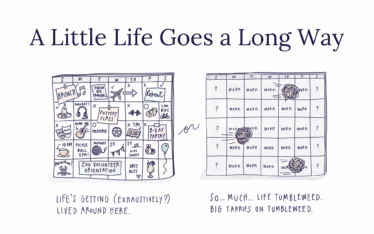Putting positivity in perspective.
Norman Vincent Peale, grandfather of the think-yourself-happy movement and author of the enormously popular The Power of Positive Thinking, once said, “There is a deep tendency in human nature to become precisely what you visualize yourself as being.” If you think you’re a talentless loser, things might not go so well for you in life. If you think you’re good enough, smart enough, and that doggone it, people like you, well, you might just end up successful (and on SNL). (Or ultimately resigning from Congress… but let’s agree to keep this piece a positive one.)
Helen Keller, who needs no aside, once said, “Keep your face to the sunshine and you cannot see a shadow,” which sounds like it’s meant to be on a motivational poster, and maybe a wee bit naïve. Type “positivity” into Pinterest and prepare yourself for an onslaught of platitudes (in such cute fonts, though), even some for the STEM-sort: “Think like a proton and stay positive.” Who knew there could be saccharin in science?
It’s not that thinking positively isn’t a wondiferous thing to do, because I’m all about choosing my attitude, silver linings, and turning my frown upside down. Positive affirmations have a place, as do positive quotes and surrounding yourself with positive people (because really, who wants to go out to lunch with Debbie Downer?).
The issue with our positive-obsessed culture is that it has the potential to set us up for disappointment. Just like how hope is not a strategy, positivity is not a strategy. Subscribing to the cult of optimism without actually doing anything about your situation in life is like positive vibe-ing yourself to win the lottery without ever buying a ticket. Positivity in the absence of a plan is pointless.
So how do you turn the Power Positive Thinking into something PRODUCTIVE?:
Stop thinking of positivity as a panacea.
This one’s just a reality check. Deliverance from suffering can’t really be had from just believing things are going to be great. Keeping up with our earlier science theme, if Spectacular was an element on the Periodic Table, positive thinking would be an instrumental part of each atom (yes, the protons!), with many other components. Er, compounds?
Think like a Stoic, a little bit.
These ancient philosophers believed that the path to happiness might depend on negativity. Check out this snippet from Oliver Burkeman’s delicious little book called The Antidote: Happiness for People Who Can’t Stand Positive Thinking:
“For the Stoics, the ideal state of mind was tranquility, not the excitable cheer that positive thinkers usually seem to mean when they use the word ‘happiness’. And tranquility was to be achieved not by strenuously chasing after enjoyable experiences, but by cultivating a kind of calm indifference towards one’s circumstances. One way to do this, the Stoics argues, was by turning towards negative emotions and experiences; not shunning them, but examining them closely instead.”
I’m not advocating that you swim repeated laps in your festering pool of discontent. I’m thinking that if you can examine what it is about your boss that riles you up so much, you stand a fighting chance to either become at peace with it, do something to change it or remove yourself from the situation (or company).
If you’re not clicking at your company and you’re feeling left out, what’s really going on there? Is it them or you or both? And if your 360º review was unnerving, what can you examine in the feedback? What can you examine in the spaces between the lines of crappy feedback? Get curious about your negative emotions to ultimately learn from them. Everything in moderation– even positivity, right?
It’s all about the action plan.
I loved working with K. last month, a recent college graduate who was smart, fun and completely frustrated about not finding the job of her dreams. Our first conversation went something like this:
K.: “I’ve been trying to stay so positive… looking on the bright side, hoping for the best.” (Tears welling.)
Me: (Furrowing my brow in a concerted gesture of empathy.) “That’s great. What sorts of things have you been doing about your job search so far?”
K.: (Blank stare.)
Is it possible that K. read a line like, “Think positive and the rest will follow,” on Pinterest and thought that things might happen because she had good intentions? It probably wasn’t that rudimentary, yet so many people with great grades in school and/or great track records at work fall into the trap of hoping for the best with their careers without doing anything about those hopes.
I understand it– it’s hard to create a map or a plan when you don’t exactly know where you want to go, or the route(s) to get there– yet it’s always worth it to draft something, sleep on it, and see what you think. Have someone you trust take a look at it. I can help if you’re still stuck at that point, too. At every step of the way, make sure you’re doing something to move forward, not hinging your career path on optimism and optimism alone.
Almost everyone I know who has an amazing career has a bias towards action – they took steps to get to where they are today, and they’re planning where they want to go next. These folks also tend to view the world in a glass-half-full kind of way. Now that’s a positively successful combination of attributes.







